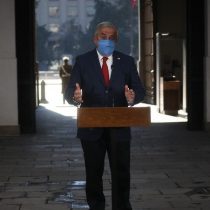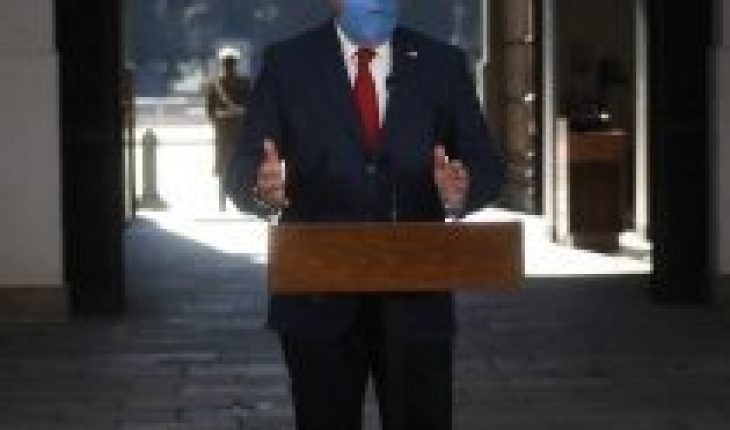
“It is my republican duty to step aside,” Jaime Mañalich said after leaving the head of the Ministry of Health. They were not words to the promptly delivered to the press, it was a closing speech of his period, which even included the installation of a podium in the courtyard of La Moneda. The former minister reviewed the measures taken during his time in the Minsal and in the face of the COVID-19 pandemic. He reiterated that he had the support of President Sebastián Piñera for every measure taken and emphasized that the decision to leave his post: “I have come to the conviction that this new stage requires new leadership,” he assigned in his speech, handed over to the press before the new minister, Enrique Paris, gave his first words in charge of the portfolio.
An unusual farewell for an outgoing minister, but, “Mañalich was not any minister”, they stand out within officialism. The former head of the Health portfolio is a member of the hard core of the piñerismo, an untouchable, condition he was aware of, and who is partly credited with the pride that brought so many complications to his work including the first government where he served the four years as head of health.
Before the appointment of Henry Paris, it was already confirmed in the palace corridors that the idea of taking “a step to the side” would have arisen from Mañalich himself, although inside the hosts of Chile Vamos had already installed the idea that the former director of the Las Condes Clinic should leave his post.
During the last week, criticism of the failure of the “Battle of Santiago” and the lack of transparency of the Minsal, regarding active cases and deceased people, had become cross-cutting in the world of health, science, civil society and the political world. But that was not enough to consider his departure because, in the last great cabinet adjustment, his permanence, was read crosswise as an unequivocal endorsement of the Representative, not only to his person, but also to the strategy.
Mañalich, over time, had managed to fill in part the void left by former Minister Andrés Chadwick, in this way, had become a protective shield of the head of state, able to shield it and divert attention, but not only that, he had also managed to give a political direction to the government, which ended up transforming into a necessary foothold of support for President Piñera.
But no one is essential, it was heard to say to a member of the officialism, and what eventually ended up breaking the immunity with which Mañalich used to walk, was the loss of confidence of a significant part of Chile Vamos, who ended up taking away his floor after being “as surprised” by the difference in the number of deceased that was delivered locally , and the one sent to WHO, which they did not handle. “It feels like we’re all being deceived,” a cross-cutting sense in the governing parties, except in the UDI, where they didn’t see this change with good eyes in one of the most critical moments of the pandemic.
In this way, one of the many questions that this administration has received from its own sector has been repeated continuously, and that relates to the lack of information, coupled with changes in the direction of the strategy, which leave several of the squires “fighting only against the wind”, and that annoys, they reiterated.
On Saturday morning, President Sebastián Piñera received telephones from The National Renewal and Evópoli, to ask for answers regarding the difference of 2 thousand deceased between the Minsal figures and those delivered by the DEIS to the World Health Organization. Although Undersecretary Paula Daza noted that consideration was being considered to include the number of deceased accounted for by DEIS in the epidemiological report, “the argument that it was for WHO epidemiological surveillance was not convincing,” they say from Chile Vamos.
On this occasion, the same strategy that was always defended with teeth and teeth, was overwhelmed and fell into its own trap, because the extreme hermetism in the decision-making of the table that was part of President Piñera, the head of advisers of the second floor, Cristián Larroulet, Mañalich himself and former Undersecretary Rodrigo Ubilla, ended up hurting sensitivities in his own hosts.
Prior to that, the total loss in the credibility of the official information of the figures had been added, an unforgivable loss for any governmentor, they said from the executive’s internal. This then for more than a week from Minsal were not able to explain and convince why the new change of methodology to account for the deceased. Undoubtedly, moving away from the back of following WHO guidelines was a fatal blow to the strategy itself.
Added to this was the intense audit that was falling on the Minsal authorities. The memo sent by National Prosecutor Jorge Abbott on responsibilities in the event of those deceased by COVID-19 outside care facilities, investigations opened by Comptroller in different areas of the strategy to deal with Coronavirus, together with the Investigative Commission for the figures of the deceased, plus the subpoena of the health authorities to the Chamber of Deputies, which could lead to an early Constitutional Indictment , lit the alerts in La Moneda and the center of the Second Floor, led by Cristián Larroulet.
The appointment of Henry Paris to the Health portfolio did not cause as much surprise within the political and health world, as the former president of Colmed participated in the creation of the government program. His name has always sounded to assume the Minsal within the governments of Sebastián Piñera, even after the departure of Emilio Santelices many believed that he would be the chosen one, but the representative opted for a letter of his trust.
During the course of the pandemic, Paris took an active role, was integrated into the Social Bureau and was indicated as one of the faces of the health area that served as a support for Mañalich’s strategy. In addition, it served as a counterweight to criticism from Colmed president Izkia Siches, once, Minister Paris noted that Siches did not represent the entire medical world, as not all were in the Colmed.
Inside the palace they see in Paris the “perfect balance to calm the spirits and restore confidence”. One of its main attributes is the strong support it has within the Medical College, which he twice presided over, where its main core of voters focused on doctors in the private world, although it has respect for the more traditional sectors of the public world. “He’s not a doctor who can be criticized for his medical ethics or career, like Mañalich who was expelled from school,” says a Colmed regional authority.
On the other hand, Enrique Paris has a curriculum that gives him experience in both the area of public and private health. Those who know him point out that he has “special affection for his work done in Chiloé”, when he was a general practitioner of the area. On the other hand, they point out that their leadership is different from that of former Minister Mañalich, who despite having “a strong character”, does not marry an idea until the end, and that if scientific evidence suggests that his strategy is failing he will not “hesitate to change it”.
The new minister’s more dialogueal character was evident in his speech after taking over the health portfolio. He called on “the whole scientific community” and the entire field of health to come together and work together. “We must receive the divergent views and those that support the current policy in order to bring out the best in Chile, the best of the homeland,” he said.
Although, he also stressed that “this is a ministry, in a sense, of continuity” of Minister Mañalich’s administration, which has sown doubt as to whether the change in government strategy will be only discursive or also in the strategic deployment to the pandemic.
The president of the Medical College, Izkia Siches pointed it out in several media interviews, where she emphasized that changes to the strategy the government has had so far needed. The “new Min. Dr. Enrique Paris faces the immense challenge of profoundly shifting the health strategy to one of collaboration, transparency and concrete measures to cut the chain of transmission. For this task he has full disposition of the Colmed”, he highlighted in his Twitter account.
Mañalich’s responsibilities
Although the departure of Jaime Mañalich decompresses the pressure of recent weeks on the government of Sebastián Piñera, there are still several loose ends regarding the strategy that has been taken to deal with the Coronavirus pandemic. Within the opposition they emphasize that this change in the team is a declaration of “goodwill”, but that it does not erase the mistakes that the Minsal has had in the last two months”.
During the last week several opposition leaders came out to call for the resignation of Minister Mañalich, including Meps Maya Fernández (PS) and Carmen Hertz, DC Vice President Carmen Hertz and formerPresidential didata of the Broad Front, Beatriz Sánchez, although in the palace they claim that such actions “had nothing to do with the departure of former Minister Mañalich”, if there was a strong concern for the political and judicial actions that had slipped from the opposition.
One of them is the subpoena of the authorities of the Minsal to the Camar de Diputados requested by the bench of the Christian Democracy, the opening of an Investigative Commission for the numbers of deceased persons and the study of a legal action in case irregularities are established in the accounting and data delivered by the Minsal. All actions that remain standing, despite the departure of Mañalich, including a constitutional accusation against him, when the pandemic passes.
Gabriel Ascencio, head of bench of D.C. deputies, noted that “the arrival of Enrique Paris is useless if it does not change the strategy imposed by Mañalich that has resulted in the drama of thousands of families and Chileans who have spread and seen their relatives die. At the next hour we will have to wait for how the new minister who was always committed to Mañalich’s strategy reacts.”
Senator Alejandro Navarro wrote on his Twitter that President “Piñera is late. Mañalich lied to Chile, his house of cards fell over thousands of lives. This does not end here, Mañalich must face a Constitutional Indictment,” which is backed by former New Majority parliamentarians.
MeP Gael Yeomans and President of Social Convergence, said that “from our party we are evaluating criminal and political actions to pursue all the responsibilities that this cabinet change does not solve, and that we cannot leave there. We will be gathering information, talking to different actors and seeing the most reasonable mechanisms and times to take these actions taking into account that the most important thing is to address the health urgency that we are experiencing.”
A vital point that is being reviewed within the government is the possibility of shielding President Sebastián Piñera and former Minister Jaime Mañalich in the face of a judicial process that may end in an international court. The news that the Paris Prosecutor’s Office opened an investigation into the public management of the authorities to deal with the pandemic caused concern, as the Comptroller’s Office is already investigating several areas of the Minsal’s performance in the face of the pandemic, in addition to the request made by former Minister Mañalich himself for the auditing authority to investigate the formula for counting the deceased.





